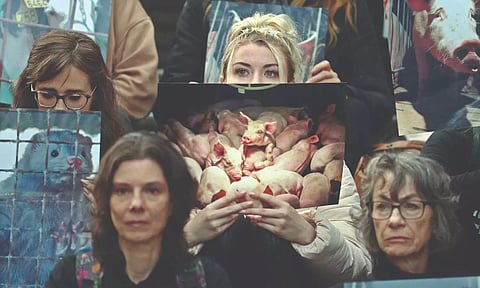

By NICHOLAS KRISTOF
In 1971, a half-dozen graduate students at Oxford University held what was perhaps the first protest of the modern animal rights movement. They insisted that respecting animals was a moral imperative. And the world changed.
No, not right away. But one of those students, a young Australian philosopher named Peter Singer, turned his ideas into a transformative 1975 book, “Animal Liberation,” that was initially mocked for overreach. “The animal movement was still widely seen as crackpot,” Singer recalls. Yet to anyone who thinks that ideas are irrelevant in a practical age, think again. His arguments stirred a slow-motion revolution that has changed the way we treat other animals. Singer has just issued a new edition of the book, updated and titled “Animal Liberation Now.” It’s a monument to the remarkable spread of the ideas he articulated in 1975. At least nine states and the European Union now ban veal crates, hen cages or tight stalls for sows. The top supermarket chains in America have agreed to sell only cage-free eggs by 2026, and McDonald’s has done the same.
A court in Argentina accepted that habeas corpus rights apply to a chimpanzee. Israel and California have banned the sale of fur coats. Pope Francis has suggested that animals go to Heaven and that the Virgin Mary “grieves for the sufferings” of mistreated livestock. How times have changed. When Mary Wollstonecraft advocated for the rights of women in 1792, that seemed to some so ridiculous that a satirist mocked her by calling for the rights of animals as well. Now it’s unquestioned (at least in the abstract) that rights extend to people of all races and religions, including women, and in some cases to animals as well. When voters face referendums on animal rights, they often approve them by large margins. Yet there’s so much more to be done, as the new edition of Singer’s book documents. Agribusiness has been very successful at two things: producing very cheap protein and hiding from public view the cruelty that has been ingrained in factory farming to cut costs.
An individual seen whipping a dog risks arrest, but CEOs whose companies in effect torture chickens are celebrated for their business acumen. Individualized animal abuse is a crime; systematic animal abuse is a business model.
Singer writes about how poultry have been bred so birds grow extremely quickly and with huge breasts, since breast meat is particularly valuable. By one estimate, if human babies grew at the same pace as today’s broiler chickens, at two months they would weigh 660 pounds — so it’s no surprise that chickens’ legs often give out and that by some accounts they suffer chronic pain. We haven’t figured out our moral obligations to fellow humans, so perhaps it’s understandable that we haven’t worked out our obligations to shellfish. But the way people struggle with these questions strikes me as a measure of moral progress — and of the power of ideas.
Kristof is columnist with NYT©2023
The New York Times